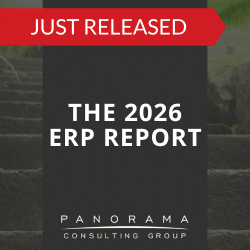One of the main reasons our clients hire us to handle contract negotiations as part of our ERP selection process is because clients don’t want to – or necessarily know how to – deal with ERP vendors. Aggressive sales tactics, hidden fees, confusing contracts and over-licensing are just some of the pitfalls that most organizations aren’t well-equipped to deal with, either because they lack the necessary experience, don’t have the time or bandwidth, or both. Once a company has selected a new ERP software system, it is easy to forget that sometimes things go wrong with ERP vendors.
Case in point: last month’s federal lawsuit brought against Infor by a manufacturing company claiming that they were subject to roughly $130 million $130,000 (corrected from earlier publication) in additional license fees after a voluntary software audit from the vendor revealed that a number of outside contractors were accessing and modifying the system. We don’t know the details of this situation, as we did not help the plaintiff with their ERP selection or implementation initiatives and neither the plaintiff nor defendant has requested our ERP expert witness services as of the time of this posting, but we know that this scenario is a common fear and complaint of customers of ERP systems. While it’s impossible to say with certainty at this point, it is probably safe to assume that there was some sort of contractual clause subjecting the customer to additional fees as their user count increased over time.
Although most contracts with ERP system vendors don’t lead to lawsuits, this situation underscores of three key things to keep in mind when embarking on an ERP selection and implementation process:
- Read and understand the contract. Most of our clients read their contracts, but most don’t understand what these documents really say and, just as importantly, what they don’t say. Unless you are an expert that reads and negotiates ERP software contracts for a living, as our team members are, then you’re not likely to fully understand many of the assumptions, hidden costs, liabilities and risks of your ERP license contract. For example, subtle but important clauses regarding caps on license and maintenance escalation in the future can have a multi-million dollar impact on the total cost of ownership of your ERP software. In addition, implementation services contracts from ERP vendors or system integrators are fraught with risks and pitfalls as well, especially those that entail fixed bid costs. To add insult to injury, most ERP vendors, VARs and system integrators only address the software aspects of an ERP system rather than the more important business process, project management and organizational change management components, which entail costs and resources as well.
- Don’t poison the pond. Clients hire us because we are independent and therefore negotiate aggressively with ERP vendors, but we stop short of poisoning the pond with the chosen software provider. Although you don’t want to get raked over the coals as it relates to software and maintenance pricing, you also don’t want to create a relationship that isn’t profitable to the vendor as well. At the end of the day, you want to know that your ERP vendor has a vested financial interest in providing support and service for their product in the future.
- Your sales rep likely won’t be around for the ten years that you use your ERP software. ERP software purchases are usually facilitated by sales reps that are very nomadic in nature. It is extremely uncommon for a sales rep to be in the same sales group, geography or even the same company for years at a time, so it’s not realistic to think that your software sales rep will be supporting your account for the duration of the ten to 12 years that most companies use their ERP software. For this reason, it is critical that everything you agree to be included in your software and services contracts. Sales reps come and go, and your contract is not with your sales rep – it’s with your ERP vendor – so it’s important that you think about and plan for the worst possible scenario.
Lawsuits and disputes happen, but ones such as Micromatic vs. Infor can be avoided with a tight understanding with your ERP vendor, clearly documented in a contract. The above tips and challenges aren’t by any means limited to Infor customers, by the way. Infor happens to be the defendant named in this particular suit, but these negotiation and contractual challenges are relevant regardless of your chosen ERP vendor.
Correction: Panorama initially wrote that the additional licensing fees were roughly $130 million; they were actually for roughly $130,000. We apologize for the typo.












